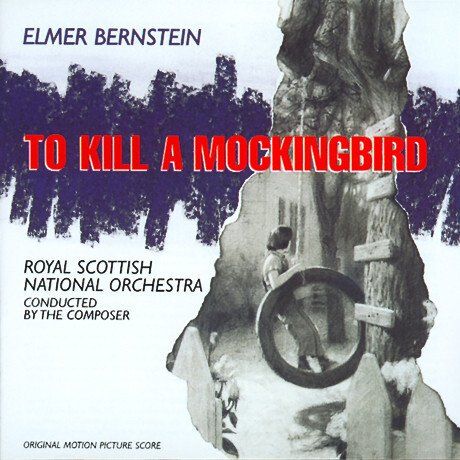To Kill a Mockingbird

Label:
Varèse Sarabande
Catalogue No:
VSD 5754
Release Date: 1997
Total Duration: 41:36
UPN: 0030206575422
The Royal Scottish National Orchestra conducted by Elmer Bernstein
The 1962 film, To Kill A Mocking Bird was one of the most memorable and distinguished films to have emerged from Hollywood. Indeed it was critically acclaimed and highly praised for its enlightened social conscience and evocative atmosphere. It won three Oscars - for Best Screenplay, Best Actor (Gregory Peck) and Best Art Direction - Set Direction. It also scooped five Academy Award nominations for Best Picture, Best Director (Robert Mulligan), Best Cinematography, Best Supporting Actress (juvenile actress, Mary Badham) and Best Music Score (Bernstein).
Elmer Bernstein's score was itself a milestone. It went against the usual practice of using a large orchestra and employed instead, for the most part, a chamber orchestra with much accent on solo instrumental work; piano, flute and clarinet being amongst the featured instruments. The film is set in1930s Alabama and tells the story of a widowed lawyer, Peck, and his admirable attempt to defend a black man wrongly accused of raping a white woman. More tellingly, it is the story of the lawyer's two motherless children and the struggles they encounter while growing up in a racially segregated, economically impoverished town. The film is an accurate mirror of the period and a critique of an offensive status quo. Bernstein found the assignment difficult. Quoting the fine CD booklet notes by Kevin Mulhall, Bernstein commented, "It took me six weeks to even get off the ground with that score...I really scared myself until I finally realized the whole point of the score... that its real function was to deal in the magic of a child's world. That was the whole key of that score and it accounts for the use of the high registers of the piano and bells and harps, things I associated with child magic in a definitely American ambience." The music for
To Kill A Mockingbird is warm, lyrical curious, buoyant, impressionistic and occasionally nightmarish - all characteristics of a child's life...Looking back on his lengthy and distinguished career, Bernstein confesses that time has failed to erode his love of the film. "I continue to have tremendous feeling for the movie," he admits, "and the score is one of my personal favourites."
This tremendous feeling of warmth and affection for his music comes over in an inspired performance; Bernstein drawing the very best from the Scottish players. Rarely has the lovely haunting theme sounded so magical, swelling out on the strings after stealing in gently following the evocative, homely opening passage on piano, harp and flute. Every one of the 14 cues are memorable. The music cleverly evokes the thoughts, emotions, reactions even the movements of the children. Much is impressionistic, sometimes the music is gentle, kindly, comfortable, noble; sometimes it is playful and high-spirited for the children at play, at other times as in "Ewell's Hatred" and "Assault in the Shadows", it is creepy and sinister, marked by swirling and hard-driven strings, snarling brass and hard percussive punctuations. "The Guilty Verdict" is remarkable for its restraint yet, at the same time, it is deeply affecting in its simple nobility. It is associated with the scene in the courthouse. Despite Peck's strong defence, the accused is found guilty but as Peck leaves the blacks in the room all rise in respect for his dedication, a memorable moment beautifully distilled in the music. In all, this is a monumental score for a perfect film - and splendidly realised.
Originally published @ MusicWeb International / Text reproduced by kind permission



